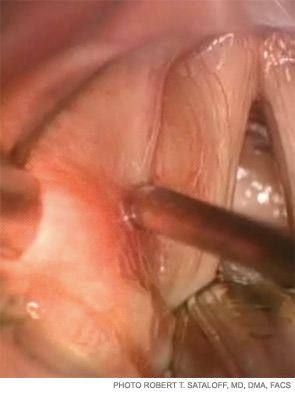People get face-lifts and other types of cosmetic surgery to look better. They exercise so that they’ll feel better. But few people consider a voice lift, which combines surgery and exercise to make them sound better.
Explore This Issue
April 2010“People spend thousands of dollars on chin implants, rhinoplasties, face-lifts, body sculpting, and then they open their mouth and everyone knows instantly they’re 80 years old,” said Robert T. Sataloff, MD, DMA, FACS, who invented the term “voice lift” during an interview with a reporter several years ago. “This is not necessary,” said Dr. Sataloff, professor and chairman of the Department of Otolaryngology—Head and Neck Surgery, and senior associate dean for Clinical Academic Specialties at the Drexel University College of Medicine in Philadelphia. “The vocal characteristics that cue people to advanced age are subject to alteration.”

But should vanity be the motivation for a voice lift? Many laryngologists dislike the term itself because it makes the exercises and surgical procedures involved sound cosmetic rather than therapeutic.
“Vocal fold microsurgery is not to be viewed as rejuvenation,” said Robert W. Bastian, MD, founder of the Bastian Voice Institute in Downers Grove, Ill. “Instead it should be seen as an attempt to return to original capabilities that have been diminished by an injury or lesion. You’re not rejuvenating because of aging or the passage of time.”
Yet, the term “voice lift” has caught on among laryngologists, who agree that the procedures involved are becoming more common, although no numbers are available. “There weren’t as many older individuals 50 or 60 years ago, so the aging voice wasn’t much of a concern,” said Michael M. Johns, MD, director of the Emory Voice Center at Emory University Hospital Midtown in Atlanta. “It’s going to be a growing problem, given that the baby boomers have entered retirement age.”
Treatment
The voice lift does not necessarily mean surgery. Most of what is known as a voice lift can be achieved through exercise alone, according to Dr. Sataloff. “At least 75 to 80 percent of people looking for improvement can achieve their goals through voice therapy and rehabilitation,” he said. “One reason I wish I hadn’t invented the term ‘voice lift’ is that it makes people think they can get a quick operation and go home. It doesn’t work that way.”
The voice lift begins with a thorough exam to rule out other health problems. Laryngeal pathology, including laryngopharyngeal reflux disease (LPR), nodules and polyps, must be excluded. Emphysema and other lung problems that can reduce the airflow needed to produce sound also need to be considered.
 People spend thousands of dollars on chin implants, rhinoplasties, face-lifts, body sculpting and then they open their mouth and everyone knows instantly they’re 80 years old.
People spend thousands of dollars on chin implants, rhinoplasties, face-lifts, body sculpting and then they open their mouth and everyone knows instantly they’re 80 years old.—Robert T. Sataloff, MD, DMA, FACS
Treatments for other health problems may affect the voice, too. “Medications for high blood pressure, depression and other disorders can affect the voice,” Dr. Sataloff said. “Many meds can cause drying, tremor, loss of concentration and other side effects that may impair phonation.”
Leave a Reply